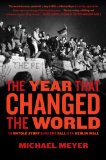The Untold Story Behind the Fall of the Berlin Wall

Readers' rating:
Published Sep 2009
272 pages
Genre: History, Current Affairs and Religion
Publication Information
"Mr. Gorbachev, tear down this wall!" President Ronald Reagan's famous exhortation when visiting Berlin in 1987 has long been widely cited as the clarion call that brought the Cold War to an end. The United States won, so this version of history goes, because Ronald Reagan stood firm against the USSR; American resoluteness brought the evil empire to its knees.
Michael Meyer, who was there at the time as a Newsweek bureau chief, begs to differ.
In this extraordinarily compelling account of the revolutions that roiled Eastern Europe in 1989, he shows that American intransigence was only one of many factors that provoked world-shaking change. Meyer draws together breathtakingly vivid, on-the-ground accounts of the rise of the Solidarity movement in Poland, the stealth opening of the Hungarian border, the Velvet Revolution in Prague and the collapse of the infamous wall in Berlin. But the most important events, Meyer contends, occurred secretly, in the heroic stands taken by individuals in the thick of the struggle, leaders such as poet and playwright Vaclav Havel in Prague; the Baltic shipwright Lech Walesa; the quietly determined reform prime minister in Budapest, Miklos Nemeth; and the man who privately realized that his empire was already lost, and decided - with courage and intelligence - to let it go in peace, Soviet general secretary of the communist party, Mikhail Gorbachev.
Reporting for Newsweek from the frontlines in Eastern Europe, Meyer spoke to these players and countless others. Alongside their deliberate interventions were also the happenstance and human error of history that are always present when events accelerate to breakneck speed. Meyer captures these heady days in all of their rich drama and unpredictability. In doing so he provides not just a thrilling chronicle of the most important year of the twentieth century but also a crucial refutation of American political mythology and a triumphal misunderstanding of history that seduced the United States into many of the intractable conflicts it faces today. The Year That Changed the World will change not only how we see the past, but also our understanding of America's future.
"Starred Review. Meyer skillfully grasps the crux of these events and ably conveys their remarkable significance. Meyer 'liberates' the record with sagacity, precision and remarkable clarity." - Kirkus Reviews
"The twentieth century ended with a bang in 1989 and Michael Meyer has vividly captured the drama, import and energy of that fascinating year....This is a riveting, rollicking read with many surprises along the way." - Fareed Zakaria, author of The Post-American World
This information about The Year that Changed the World was first featured
in "The BookBrowse Review" - BookBrowse's membership magazine, and in our weekly "Publishing This Week" newsletter. Publication information is for the USA, and (unless stated otherwise) represents the first print edition. The reviews are necessarily limited to those that were available to us ahead of publication. If you are the publisher or author and feel that they do not properly reflect the range of media opinion now available, send us a message with the mainstream reviews that you would like to see added.
Any "Author Information" displayed below reflects the author's biography at the time this particular book was published.
Michael Meyer first went to China in 1995 with the Peace Corps. The winner of a Lowell Thomas Award for travel writing, Meyer has also won a Whiting Writers' Award for nonfiction and a Guggenheim Fellowship. His stories have appeared in the New York Times, Time, Smithsonian, Sports Illustrated, Slate, the Financial Times, the Los Angeles Times, and the Chicago Tribune. He is the author of The Last Days of Old Beijing, which became a bestseller in China, and he divides his time between Pittsburgh and Singapore





The Funeral Cryer by Wenyan Lu
Debut novelist Wenyan Lu brings us this witty yet profound story about one woman's midlife reawakening in contemporary rural China.
Your guide toexceptional books
BookBrowse seeks out and recommends the best in contemporary fiction and nonfiction—books that not only engage and entertain but also deepen our understanding of ourselves and the world around us.